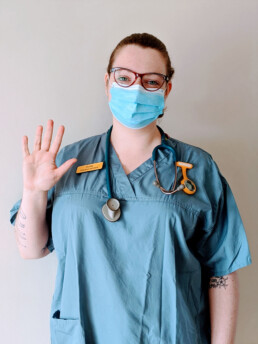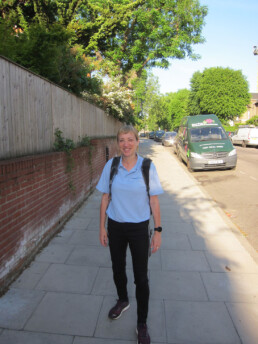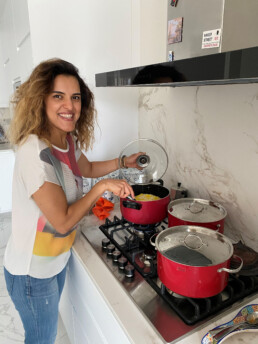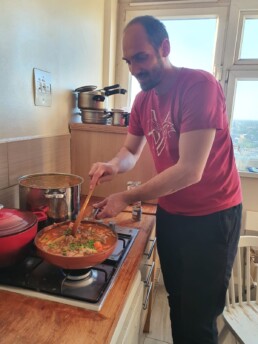Features | By Hamdi Khalif
Continuity and collective effort amid Covid-19
When the World Health Organization declared a novel flu-like outbreak as a pandemic on 11th March 2020, it became apparent that usual ways of working would no longer be viable. Shortly after, City sought to move online, a momentous task at the time, to ensure the safety and welfare of its staff and students. With offices and education rooms being swapped for remote ways of working, internet access became a necessity. Yet, the world has never been closer nor more united.
In the face of uncertainty, City sought to establish a sense of normalcy, such as using coursework rather than examinations assessment and moved many events online. While it was imperative to ensure business continuity, the work didn’t stop there. City was keen to support in efforts to combat the virus. Several of our academics advised the Government on key issues and some supported the opening of the new Nightingale Hospital. Meanwhile, other colleagues joined forces to support the physical and mental wellbeing of staff and students through conducting sport classes via Facebook Live to drop-in mindfulness workshops.
Here are the stories of some of City’s heroes.
City academics offer expert advice
Several City academics have been busy offering expert advice to policy makers, the media and the general public on key issues such as projections for the pandemic, a potential food supply crisis and decline in mental wellbeing.
Dr Mark Honigsbaum, medical historian and Lecturer in Journalism, launched a new series on his Going Viral podcast focusing on the Covid-19 pandemic. With a recent book titled The Pandemic Century: One Hundred Years of Panic, Hysteria and Hubris, Dr Honigsbaum is well-placed to offer expert advice on the current pandemic, which he did on the likes of Al-Jazeera’s Inside Story and Russia Today.
Tim Lang, Professor of Food Policy, wrote a letter to the Prime Minister, in which he called the public messaging around food supply ‘weak and unconvincing’. In the letter, Professor Lang and fellow experts expressed concerns about food availability and the need to prioritise those on low incomes, who were experiencing food-related inequalities even before the pandemic.
Professor of Information Science, David Bawden and Reader in Library & Information Science, Dr Lyn Robinson warn that the pandemic has given rise to a relentless flood of information, leading to many seeking out the sensational and bizarre. Professor Bawden and Dr Robinson have been studying the Too Much Information (TMI) effect for over twenty years. They summarised their findings in articles for News Medical Life Sciences and Phys Org.
School of Health Sciences students support the NHS
Hundreds of students from the School of Health Sciences, including nursing, midwifery, speech and language and radiography studentshave been supporting the NHS to deliver much needed services as part of the national effort to tackle Covid-19.
Nursing and midwifery students at City are typically expected to undertake clinical placements for up to half of the academic year but amid the pandemic, many chose to extend their time on placement. With the increasing strain on the NHS, the Chief Nursing Officers for the four UK nations, the Nursing and Midwifery Council, the Council of Deans of Health, the Royal Colleges, trade unions and the UK Department of Health and Social Care gave the option to nursing and midwifery students in the last six months of their final years to support the NHS full-time. Postgraduate students not in their final six months of study and second year undergraduate students were given the option to contribute 80 per cent of their study time to work on a clinical placement.
Hundreds of City students took up these options, choosing to provide vital healthcare to those in need. Katie, a Midwifery student says, “I am so grateful for all the support and encouragement I have received in continuing my training in very strange circumstances. Midwifery is a very special profession and a true privilege. The pandemic and the opportunity to continue the course have only highlighted that for me”.
Professor Debra Salmon, Dean of the School of Health Sciences at City, says, “I am immensely proud of the many students who will be using their skills, training and experience to help tackle the Covid-19 pandemic. Our students have shown great dedication to their chosen professions and supporting our NHS at the time when this is needed most.”

Alumni start-up delivers PPE to key workers
Alumni Manoj Varsani (Computer Science with Artificial Intelligence, 2007) and Marco Ferrari (Executive MBA, 2017) joined forces to establish a website where key workers can request personal protection equipment to help them undertake their vital work against Covid-19. SOS Supplies was born one weekend after Harrow Carers, the charity for which Manoj volunteers as Chairman, ran out of basic supplies such as surgical masks and hygiene gels. Manoj immediately thought of other key workers across the country and how they are likely also to be struggling with obtaining personal protective equipment, so he sought the support of colleague and fellow alumnus Marco to devise a plan to meet the national shortage. SOS Supplies was launched shortly after and has quickly become the “go to” place to order personal protection equipment, allowing many to work safely.
Training staff at the Nightingale Hospital
Professor of Critical Care Nursing, Leanne Aitken, was approached by Health Education England to provide training and education to healthcare staff at NHS Nightingale, the temporary facility established in East London to support the pandemic. NHS Nightingale hosted by the ExCel Centre, a venue best known for exhibitions and high-profile sporting events, was transformed into a hospital in just nine days. It has the capacity to treat 4,000 Covid-19 patients.
Professor Aitken’s research focuses on interventions to improve recovery time either during or after critical illness and the decision-making practices of critical care nurses. “The importance of developing staff to be confident and prepared to provide safe patient care for very vulnerable patients should not be underestimated” she says.
When talking about her team at Nightingale, she says “The team developing and providing the training comes from many different backgrounds. Its members have shown enormous enthusiasm, dedication and creativity and it is rewarding to see their achievements.”
Alumna uses speech and language therapy to uplift pandemic patients
Leigh Andrews (Speech and Language Therapy, 2019) has been working with people living on the streets or in hostels, who have hit hard times in their lives. The pandemic has exacerbated the conditions of those living on the streets, making them more exposed and vulnerable than ever before. To try and mitigate these harmful effects, some local councils have sourced hotel accommodation for people who are homeless so that they can safely self-isolate. As the pandemic has caused disruptions in all sectors, homeless organisations opted to send the food packages that they would normally prepare straight to the hotels. Leigh says, “all homelessness organisations have had to rethink how they work and there have been interruptions or closure of some services that are essential to people previously living on the street.”
Leigh became involved with the efforts to support people living on the streets through her company, Change Communication. She says, “Westminster City Council recognised that some people hosted in hotels may have communication needs. They asked Change Communication to help guests understand the purpose of the hotel stay and the steps they could take to keep safe.” Leigh supported communication on important matters such as GP calls and also created quizzes and puzzles that didn’t rely on literacy skills to help as a positive way of spending time in isolation.
Health staff return to essential work
With the NHS under increased pressure, the Government called on former, active doctors and nurses to return to work within the health service. Several staff at City’s School of Health Sciences chose to return to clinical roles, to support the nation in its biggest crisis for generations. Dr Caroline McGraw, Lecturer in the School, tells us how she found going back to working as a District Nurse. She says “district nurses deliver complex care to people in their own homes, in ‘wards without walls’. Prior to joining City in 2013, I worked as a district nurse in North London for more than 15 years. While I never imagined returning to clinical work, I now have an honorary contract with Central and North West London NHS Foundation Trust to work in the district nursing service in Camden two days a week.
“Nevertheless, it has been a life affirming experience. When the pandemic has abated, my experiences will ensure that I remember not only the extraordinary efforts of our hospital colleagues but also the efforts individual families made to ensure the safety and wellbeing of their older relatives. I will also remember the constancy of the carers who visit their clients every day to ensure they are washed, dressed and helped to eat and drink; and the small kindnesses of local communities, such as the supermarket which gave district nurses chocolate eggs to distribute to all their patients over the Easter weekend”.

Furloughed foodies
Alumni and Research Associate Miodrag Vidakovic (Engineering and Mathematics, 2012), established Furloughed Foodies, an army of volunteers who cook and deliver healthy meals to NHS workers, along with City Men’s Basketball Team. The initiative came into being after Miodrag observed that hospital canteens closed at 5.00 and any food donated was largely unhealthy chocolates and cakes. He took it upon himself to make a difference by providing hospital staff, particularly those working evenings and nights, with the option of healthy and hearty meals. Furloughed Foodies now has hundreds of volunteers preparing and delivering food at allocated times to various hospitals across London, helping key workers to carry on doing their jobs.


Sending letters of love to our heroes
Alumna Priyanka Amit Shah (Marketing Strategy and Innovation, 2018) founded Letters of Love in 2015, a not-for-profit organisation which sends handwritten letters to refugee children around the world. Its mission is simple: bring a smile to a child in hardship.
In light of the pandemic, the organisation launched its campaign #DearHeroes to send letters of gratitude to essential workers who are risking their lives daily to support everyone else. Priyanka says, “A letter is a humble attempt at spreading smiles to those who deserve it the most. It is a token of hope, personalised with a warm message, which is written by hand by our team of volunteers in the native language of the receiver”.
Whether clapping for essential workers every Thursday evening, or sending NHS staff a meal via Deliveroo, there are several ways we can show gratitude to those who are supporting our health and wellbeing. If you would like to send a heartfelt letter to an essential worker, please visit Letters of Love.